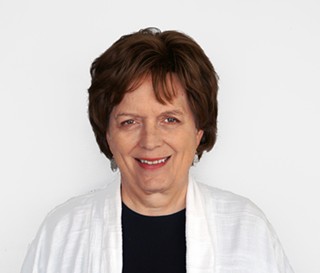Albee has stated that his play is an attempt to exorcise the demons of his own adoptive mother, who rejected him when he came out as gay. Given that background, there is less venom in this portrayal than one might expect. The playwright triangulates "Mommy Dearest" from two different perspectives. In Act One, set in an opulent bedroom, "A" is a physically fragile 92-year-old woman who laughs and cries at the slightest impulse, reminisces about her life of privilege, and hectors her caretaker. "B" is her companion and nurse who, at age 52, is hip to the manipulative ways of her employer. And the third woman, "C," is a law-firm functionary in her mid-20s, who is offended by the old woman's senility and casually bigoted remarks. Through it all, though, "A" never becomes hateful, because her vulnerabilities are so obvious. And then, at the first-act curtain, she suffers a stroke.
In Act Two, the three women become "A" at different ages, as the stroke victim, now at death's door, lies motionless under the bedcovers. Thus, Albee creates tension out of warring elements that arise within the self in the course of a person's life. As the women relate stories from their shared life -- from a short "penguin" husband to a habitually drunken sister -- they deliver Albee's trenchant comments on life and love. On infidelity: Women cheat because they're lonely; men cheat because they're men. On middle age: Being in your 50s opens up whole new vistas of decline. Then the woman's prodigal son (Jesse Kamps) returns to sit mutely at her bedside, triggering still more hurtful memories.
Bernice Bolek is exceptional as the pathetically flawed yet powerful matriarch called "A." Her expressive face is an ever-shifting landscape of emotions, transmitted by means of the subtlest expressions. Whether weeping piteously, cackling, or lashing out, Bolek forges a genuinely memorable character from Albee's brilliant prose. As "C," young Bernadette Clemens is the perfect counterpoint to "A," echoing both the strength and the underlying uncertainty of the older woman. With the bar set so high, Sherri Britton, playing "B," doesn't quite match the other two performers, tending to push her readings and force emotion, where the others let it flow. Director Licia Colombi wisely puts Albee's words first, avoiding gratuitous blocking maneuvers that could have diminished the play's impact.
Near the end, the young woman confidently inquires, "My happiest moments haven't happened yet, have they?" The baleful glances from herself, 25 and 55 years hence, send shivers down her spine. And ours as well.












